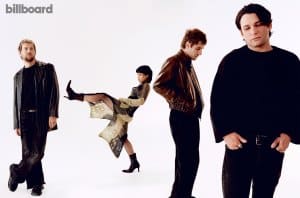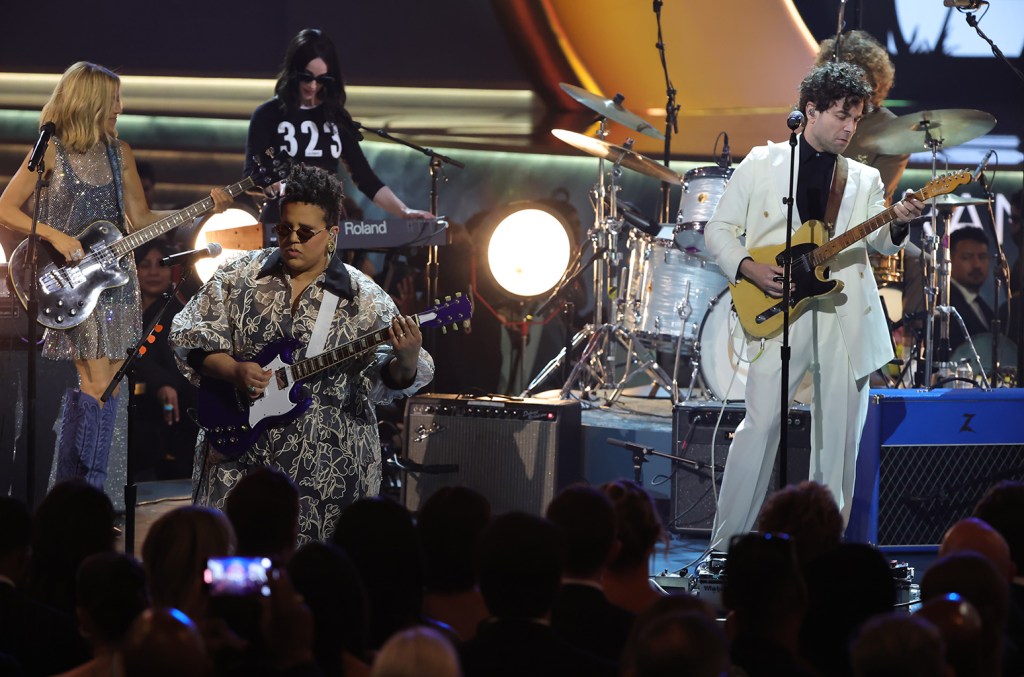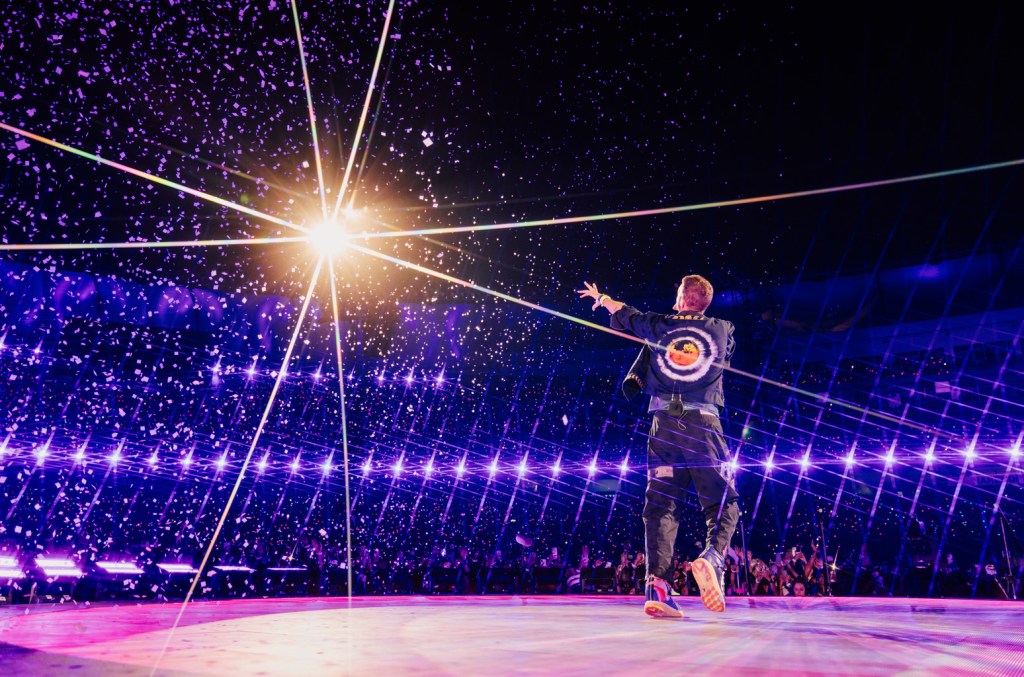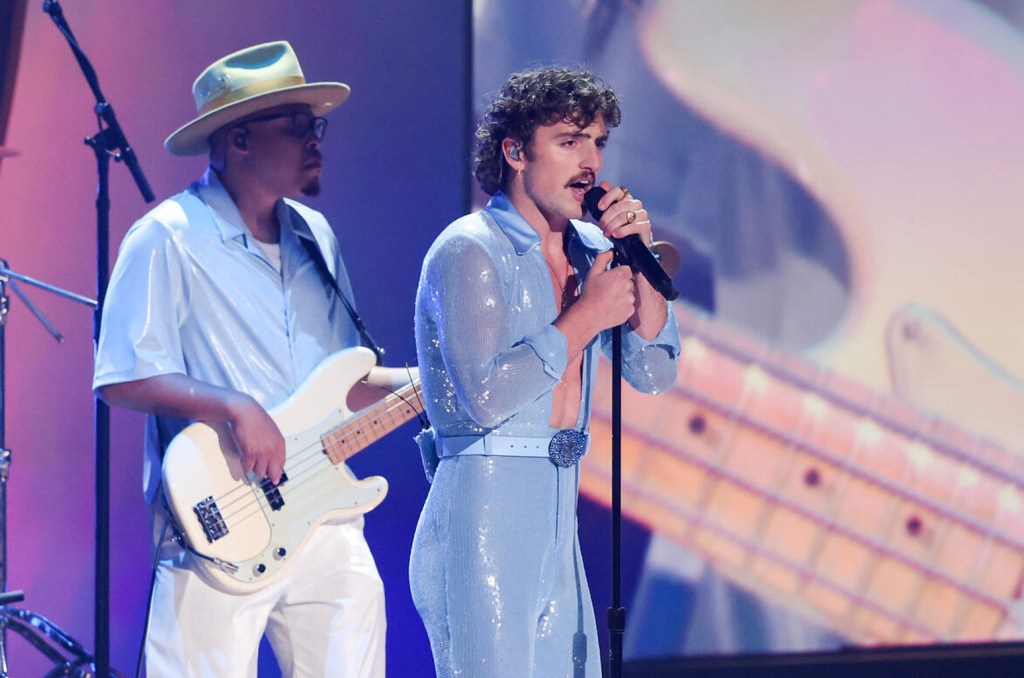Pop
Page: 62
Sabrina Carpenter is extending her Short n’ Sweet era, and she’s bringing one of her biggest heroes along for the ride. On Tuesday (Feb. 4) — two days after winning her first-ever Grammys — the pop star announced that she’s dropping a deluxe edition of her breakthrough album featuring none other than Dolly Parton on […]
The proceeds from the all-star FireAid benefit shows last month are expected to bring in more than $100 million according to organizers. In a statement released on Tuesday (Feb. 4), the team behind last week’s dual shows at L.A.’s Intuit Dome and Kia Forum said that proceeds raised by the shows will help to support the L.A. region’s immediate needs and long-term recovery from a series of wind-whipped wildfires that killed 29 people and destroyed more than 16,000 homes and other structures.
The release noted that the shows drew more than 50 million viewers across 28 streaming platforms for moving performances from more than 30 artists, including Green Day with Billie Eilish, Jelly Roll, Katy Perry, Lady Gaga, Olivia Rodrigo, Peso Pluma, Stevie Wonder, Lil Baby, Tate McRae, Sting, Alanis Morissette, Anderson .Paak with Dr. Dre and Sheila E, Dawes, John Mayer, a Nirvana reunion, Joni Mitchell, a reunited No Doubt, P!nk and the Red Hot Chili Peppers, among many others.
“The estimated amount raised includes ticket sales for both venues, sponsorships, merchandise sales, and donations from the public including generous private gifts from the Azoff family, the Eagles, Andrew Hauptman and Ellen Bronfman Hauptman, and U2,” read the release, which noted that operating costs for the six-hour benefits were offset by the NBA’s L.A. Clippers, with billionaire Steve Ballmer and wife Connie matching every pledge made during the broadcast and VOD viewing and Live Nation serving as the production partner.
Trending on Billboard
The money will go to support the L.A. region’s immediate needs, long-term recovery and forward-spinning initiatives to help prevent such large-scale fires in the future following what experts say could be the most destructive blazes in the city’s history. With fundraising still open, organizers said that they expect to begin rolling out the first grants by mid-month.
FireAid announced that it had raised more than $60 million from tickets sales and sponsorships before the show began, with all proceeds to be distributed through the L.A.-based Annenberg Foundation. The shows that came together in record time were a collaboration between Shelli, Irving, and the Azoff family, Live Nation and the LA Clippers, with Joel Gallen of Tenth Planet serving as executive producer and Rick Krim as talent producer.
“It’s almost like, an anti-pop song,” María Zardoya, the leader of The Marías, says of “No One Noticed.”
Considering the sighing production, murmured harmonies and somber lyrical tone as Zardoya pleads with a lover for attention and reassurance, “No One Noticed” understandably did not lead the indie-pop band’s second album, Submarine, upon its release last May. Yet in the months since, the song has transformed into a viral breakthrough and the band’s biggest hit to date.
Zardoya says that none of the band members expected “No One Noticed” to become The Marías’ first solo Billboard Hot 100 entry. Its success not only strengthened the band’s commercial footprint — it validated their entire aesthetic.
“It gets you in your feels — it’s pretty emotional, and kind of slow,” she says of “No One Noticed.” “It gives me hope that people are still open to listening to a song over and over that makes them cry.”
Trending on Billboard
The Marías photographed on January 15, 2025 in New York.
Caroline Tompkins
The enduring hit isn’t the bilingual, Los Angeles-based quartet’s first visit to the Hot 100, previously reaching the chart thanks to Bad Bunny: in 2022, the band was a featured act on “Otro Atardecer,” a buoyant Spanish-language album cut from the superstar’s Grammy-winning album Un Verano Sin Ti that peaked at No. 49. “That was always our No. 1 song on our Spotify page, by far, and we thought it was going to be forever,” says drummer/producer Josh Conway with a laugh. “That was a pretty big pinch-me moment, when ‘No One Noticed’ surpassed it. And now it’s surpassed it by a lot.”
The origin of “No One Noticed” predates the Bad Bunny collaboration — as well as The Marías album that came before Submarine. Zardoya, a Puerto Rico native who grew up in Atlanta, formed The Marías in 2016 when she started writing songs with L.A. native Conway, before recruiting Jesse Perlman on guitar and Edward James on keys. Following a pair of indie EPs and steady work as a touring band, The Marías signed an Atlantic Records deal in early 2021 and released their debut album, Cinema, that June.
Zardoya says that the band started writing “No One Noticed” during the pandemic in 2020, chipping away at a demo before ultimately “putting it on the back burner for a while,” then revisiting it as a potential addition to Submarine. Part of the reason why it was shrugged off for years was because as the group searched for a breakthrough single, they thought that meant something with a quicker pace than the viscous dreaminess of “No One Noticed.”
“We were understandably getting a little pressure from the label, and I think that the first thing labels look at as being a ‘hit’ is something with tempo,” Zardoya explains. So the band focused the Cinema campaign around the sleek dark-pop single “Hush,” and released the danceable electro-funk track “Run Your Mouth” as the lead single to Submarine last year. Both made the lower reaches of the Hot Rock & Alternative Songs chart.
The Marías photographed on January 15, 2025 in New York.
Caroline Tompkins
Meanwhile, Mick Management’s Jonathan Eshak, the band’s manager who started working with The Marías between their two albums, identified a sizable live base for the band and prioritized streamlining their touring agenda for Submarine. “They could play pretty large rooms — not just in New York or L.A., but in markets that are a little less traveled,” Eshak says. “But a big mission statement from María, Josh, Jesse and Eddie was they didn’t want to be viewed as just a domestic act — they really wanted to speak to fans who are either Spanish-speaking, have ancestral roots in Latin America, or are in Latin America.” As such, The Marías kicked off their tour in support of Submarine with a four-night residency at Foro Puebla in Mexico City last June, before headlining across North America throughout the summer.
As they began presenting Submarine on tour, The Marías found it interesting that “No One Noticed” would elicit some of the evening’s biggest cheers; similarly, the band would hear from friends, and read fan comments, declaring the moody track as the album standout. By July, TikTok users had adopted the song — particularly its “Come on, don’t leave me, it can’t be that easy, babe/If you believe me, I guess I’ll get on a plane” breakdown — and when Billie Eilish posted a clip of herself singing along to “No One Noticed” on her Instagram story on July 17, streams began to skyrocket.
By early September, “No One Noticed” had reached the top 10 of the Hot Rock & Alternative Songs chart. As the band was prepping for its first proper European tour for the fall, it was announced as an opener on the December leg of Eilish’s arena tour. “Billie showed love for ‘No One Noticed’ really early on,” says Zardoya, “so it was cool to perform that song live at her shows — I would dedicate it to her before we performed it, every single night.”
And as the crowd sizes increased, so did the song’s audience. Since serving as a summertime-sadness anthem thanks to its initial TikTok pickup, “No One Noticed” has crossed over to streaming platforms and even to radio. The song has 215.3 million official on-demand U.S. streams through Jan. 30, according to Luminate, and reached No. 4 on Hot Rock & Alternative Songs, No. 11 on Streaming Songs and No. 26 on Pop Airplay, where it hits a new high this week. “No One Noticed” has also peaked at No. 22 in 18 weeks on the Hot 100 and reentered the top 40 on the Feb. 1-dated chart.
The Marías are slated to perform at three South American editions of Lollapalooza in March before playing Coachella in April. Eshak says that, as the band prepares to play Submarine in front of oversized festival crowds, the rising interest in their catalog beyond “No One Noticed” demonstrates how much more growth they can achieve in 2025.
“There’s so much runway for this band,” he says. “Obviously a hit song’s a hit song, and we’ll take them where we can find them, but what I’m so excited about is how people are engaging with the band’s entire world.”
That world will also expand when the follow-up to Submarine arrives: The Marías spent some time at New York’s famed Electric Lady Studios in January and are planning on more sessions following their festival gigs in the spring.
“We were pretty surprised at how experimental things were in the studio,” says Conway of the recent sessions. “I think ‘No One Noticed’ helped pave the way for us to let our guard down a little and do whatever we want.”
Caroline Tompkins
This story appears in the Feb. 8, 2025, issue of Billboard.
A day after performing an all-star version of Randy Newman’s 1983 pop classic “I Love L.A.” to open Sunday’s (Feb. 2) 67th annual Grammy Awards, Dawes announced that they are releasing their version to help with Los Angeles wildfire relief. The proceeds from sales of the song will go to the Recording Academy and MusiCares’ […]

Taylor Swift is well-known for her enthusiastic awards show audience dancing. But at Sunday night’s (Feb. 2) 67 Grammy Awards the singer had an unexpected dance partner: Alicia Keys and Swizz Beatz’s 10-year-old son, Genesis.
Explore
See latest videos, charts and news
See latest videos, charts and news
Cameras caught Swift holding hands with the young man and jumping up and down during Shakira’s career-spanning performance, with Genesis even pulling a pro move and spinning the pop superstar around as his older brother, Egypt, 14, looked on with a smile.
People reported that proud papa Beatz also posted a snippet of the dancing video on his Instagram Story, captioning it “Gen & @taylorswift jamming.” In another picture from the Story, both boys are seen standing with Swift, with Egypt appearing to be showing the “Down Bad” singer something on his phone while Genesis stood between them.
Trending on Billboard
X user @wishescametrue posted a video noting that Swift and Genesis first met cute six years ago at the 2019 iHeartRadio Music Awards. In that video, Swift is seen waving to toddler Genesis as he sits on his dad’s lap, with Genesis waving back. Back in March 2024, Keys talked about the video, telling Tonight Show host Jimmy Fallon that in that earlier video Genesis, then three, was “flirting, like actually flirting.” She also noted that the pals had met up again at one of Swift’s Eras Tour shows and that Genesis wondered, “is she going to remember me?” Fallon then pulled out a pic from that night of Swift giving Genesis a sweet kiss on the cheek.
Keys posted pics from their Eras Tour excursion in August 2023, including snaps of Swift posing for snaps with the mother-son duo and giving Genesis a special handwritten note. “Gen, Hi my friend!!” read Swift’s card. “I was so excited when I heard you were coming tonight!! I hope you have so much fun at the show. I’ll be waving at you. Love, Taylor.
Genesis had a pretty big Grammy night with his mom. When Keys took the stage to accept the Dr. Dre global impact award she brought her youngest along with her. Standing behind his mom wearing a pair of shades, Gen watched as Keys gave shout-outs to the many people who believed in her prodigious talent early in her career.
“I just want to give big love to my brother Dr. Dre who created a sound that began a movement, and your sound told me that if you’re a creative growing up in Compton or Hell’s Kitchen, you can touch the world,” Keys said. “I always had to fight for a certain level of respect as a songwriter, a composer and especially a producer. It’s strange that we don’t think of women as producers like Quincy or Dre or Swizzy, but female producers have always powered the industry,” she added, shouting out foremothers and contemporaries Patrice Rushen, Missy Elliott, Linda Perry, Grimes and Solange.
Keys also made a point of criticizing President Trump’s executive orders rolling back the government’s diversity, equity and inclusion (DEI) initiatives as part of its first two weeks blitz of activity. “This is not the time to shut down a diversity of voices. We’ve seen on this stage talented, hard-working people from different backgrounds with different points of view, and it changes the game. DEI is not a threat — it’s a gift,” Keys said as the audience roared with supportive applause. “The more voices, the more powerful the sound. When destructive forces try to burn us down, we rise from the ashes like a phoenix. And as you see tonight, music is the unstoppable language that connects us all.”
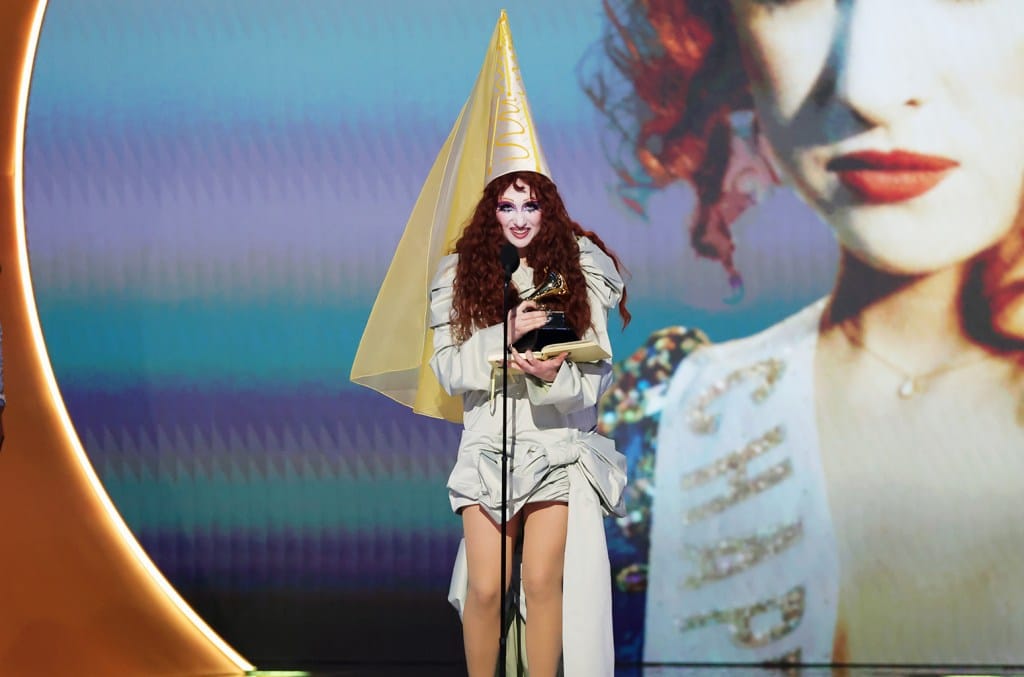
Chappell Roan knew it all along. After the “Pink Pony Club” singer capped a stellar year with a best new artist win and a headline-making performance at Sunday night’s (Feb. 2) Grammy Awards, an X user resurfaced an old video of a then-14-year-old Kayleigh Rose Amstutz accepting the first-place prize at 2012’s Springfield’s Got Talent […]
Coldplay have teamed up with Laura Mvula to cover The Proclaimers’ classic track, “Sunshine On Leith.” Watch the performance in full below. The band delivered an emotive rendition of the Scottish act’s 1988 single during a pared-back performance for BBC Radio 2’s Piano Room Month series on Monday night (Feb. 3). Birmingham-raised songwriter Mvula assisted […]

Finneas wants to spread the love following the 67th annual Grammy Awards. The superstar producer and his sister, Billie Eilish, were nominated for multiple Grammys, including album of the year for Hit Me Hard and Soft and song of the year and record of the year for “Birds of a Feather.” While the sibling duo […]
It’s going to be a sweet Valentine’s Day indeed. JISOO is less than two weeks away from dropping her highly anticipated debut solo mini-album, AMORTAGE, on Feb. 14, and the K-pop superstar continued the roll-out by unveiling the project’s tracklist on Monday (Feb. 3). Explore Explore See latest videos, charts and news See latest videos, […]
If you caught Benson Boone performing as part of the best new artist medley at Sunday night’s (Feb. 2) 2025 Grammy Awards you likely saw the singer pull off one of his signature flip-off-the-grand-piano moves. It was impressive, even more so because he busted out another forward flip later in the high-energy run of his […]

 State Champ Radio
State Champ Radio 

